Heavy rain can be a beautiful sight, but it can also expose issues in your roof. A leaky roof may be a major issue, especially during heavy downpours. You may be wondering, why does my roof leak in heavy rain? In this section, we will explore the common causes of roof leaks in heavy rain and provide insights into fixing and preventing them.
Key Takeaways
- Heavy rain can expose issues in your roof, leading to leaks.
- The causes of roof leaks during heavy rain can vary, but some common culprits include damaged shingles, clogged gutters, and inadequate flashing.
- Fixing and preventing roof leaks in heavy rain requires regular maintenance, prompt repairs, and proactive measures such as ensuring proper roof drainage.
Identifying the Signs of a Roof Leak in Heavy Rain
Heavy rain can expose underlying issues in your roof, causing leaks to appear. Identifying the signs of a roof leak during heavy rain can help you take necessary measures to prevent further damage. Here are some common signs to watch out for:
- Water stains on ceilings or walls: These typically appear as yellowish or brownish discoloration on the surface.
- Dripping sounds: If you hear dripping sounds coming from your ceiling or walls during a rainstorm, it’s likely that there’s a leak.
- Musty odor: Moisture from leaks can lead to the growth of mold and mildew, which produce a distinct musty smell.
- Visible water infiltration: If you see water entering your home during a rainstorm, it’s a clear indication that there’s a leak in your roof.
It’s important to note that the signs of a roof leak may not always be apparent during heavy rain. In some cases, leaks may only become noticeable after the rain has stopped.
Common reasons for roof leaks during heavy rain include:
- Missing or broken shingles: Over time, shingles can become damaged or displaced, allowing water to seep into the roof and cause leaks.
- Damaged flashing: Flashing is the material used to seal joints and transitions on the roof, and if it becomes damaged or deteriorated, it can allow water to penetrate the roof.
- Clogged gutters and downspouts: If your gutters and downspouts become clogged with debris, water can overflow and seep into the roof, causing leaks.
- Poor ventilation: Inadequate ventilation in the attic can lead to the buildup of moisture, which can cause mold growth and damage to the roof structure.
If you suspect that your roof is leaking during heavy rain, it’s important to take action to prevent further damage. Temporary measures such as using a tarp to cover the affected area can be effective in stopping the leak, but it’s also important to seek professional help for permanent repairs.
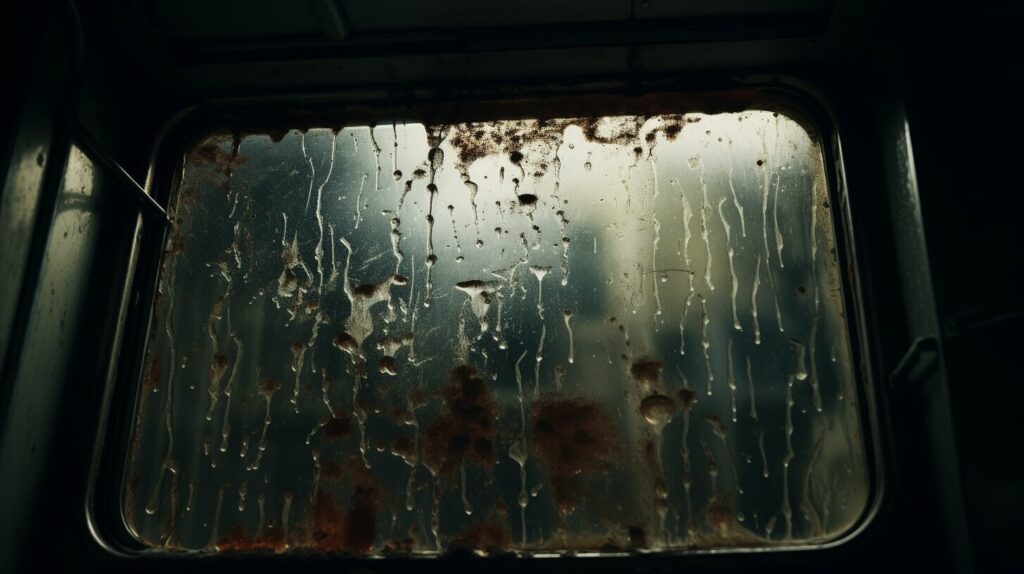
Common Causes of Roof Leaks in Heavy Rain
Roof leaks during heavy rain can be a frustrating and sometimes costly issue to deal with. To prevent leaks, it’s important to understand the common causes of roof leaks in heavy rain and how to protect your roof from them.
One of the most common reasons for roof leaks during heavy rain is due to damaged or missing shingles. Over time, shingles can become cracked, broken, or dislodged, leaving gaps for water to seep through. Regularly inspecting your roof and repairing any damaged shingles can help prevent leaks.
Clogged gutters can also lead to roof leaks during heavy rain. When gutters become clogged with debris such as leaves and twigs, water can overflow and seep into your roof. Regularly cleaning your gutters can prevent this issue.
Inadequate or damaged flashing can also cause roof leaks in heavy rain. Flashing is the material that seals the joints and edges of your roof and helps prevent water from seeping through. If your flashing is damaged or improperly installed, it may not be able to effectively keep water out. Inspecting and maintaining your flashing can help prevent leaks.
Protecting your roof from leaks during heavy rain involves regular maintenance and prompt repairs. Regularly inspecting your roof and identifying and repairing any issues can help prevent leaks. Additionally, reinforcing vulnerable areas such as skylights or roof vents can help protect your roof during extreme weather events.
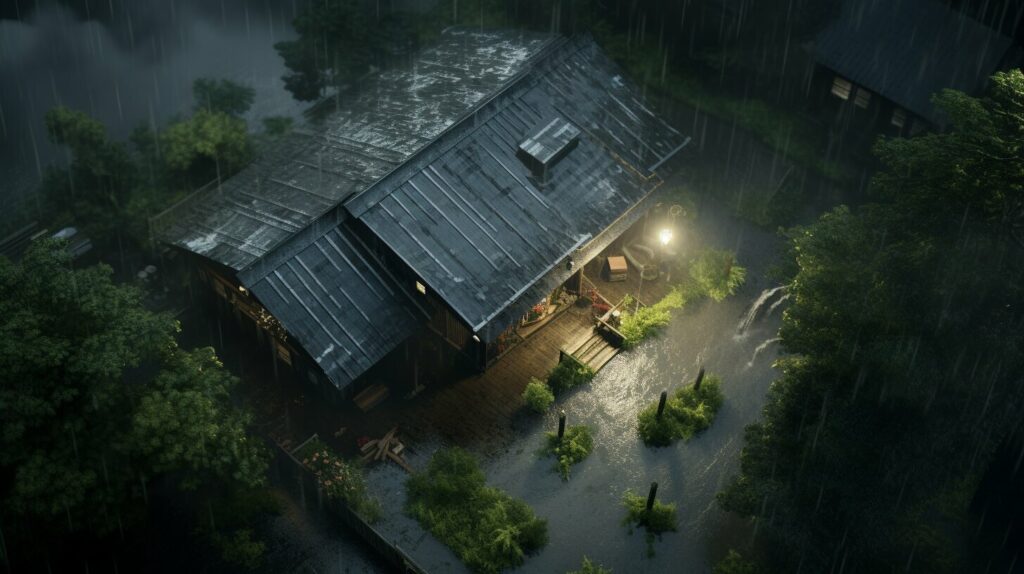
By understanding the common causes of roof leaks in heavy rain and taking proactive measures to protect your roof, you can prevent leaks and avoid costly repairs. Stay on top of regular maintenance and inspections to ensure your roof stays watertight during heavy rain.
Fixing Roof Leaks in Heavy Rain
Discovering a leak in your roof during heavy rain can be alarming, but there are steps you can take to manage the situation. Here are some tips on how to fix roof leaks in heavy rain:
Temporary Solutions
If the leak is minor and you are unable to get professional help immediately, there are temporary solutions you can use to manage the leak during the storm. One option is to place buckets or containers under the leak to catch the water. You can also use tarps or plastic sheeting to cover the affected area and prevent water from entering your home.
Note: These temporary solutions are not meant to be a permanent fix, and you should always seek professional help to address roof leaks.
When to Seek Professional Help
If you are unable to fix the leak yourself or the leak is significant, it’s important to seek professional help for permanent repairs. A roofing contractor can assess the damage and provide a solution that will prevent future leaks. In addition, they can identify any underlying issues that may be contributing to the problem.
When seeking professional help, be sure to choose a reputable roofing contractor with experience in fixing roof leaks in heavy rain. Look for online reviews and ask for references to ensure you are getting quality service.
Roof Leak Repair in Heavy Rain
Roof leak repair in heavy rain requires special care to ensure safety and effectiveness. A professional roofing contractor will use appropriate safety gear and equipment to repair the leak. They may also use specialized materials, such as waterproof sealants or roofing cement, to fix the problem.
Remember: Prompt action is key to minimizing the damage caused by roof leaks during heavy rain. Don’t wait to seek professional help if you suspect a leak in your roof.
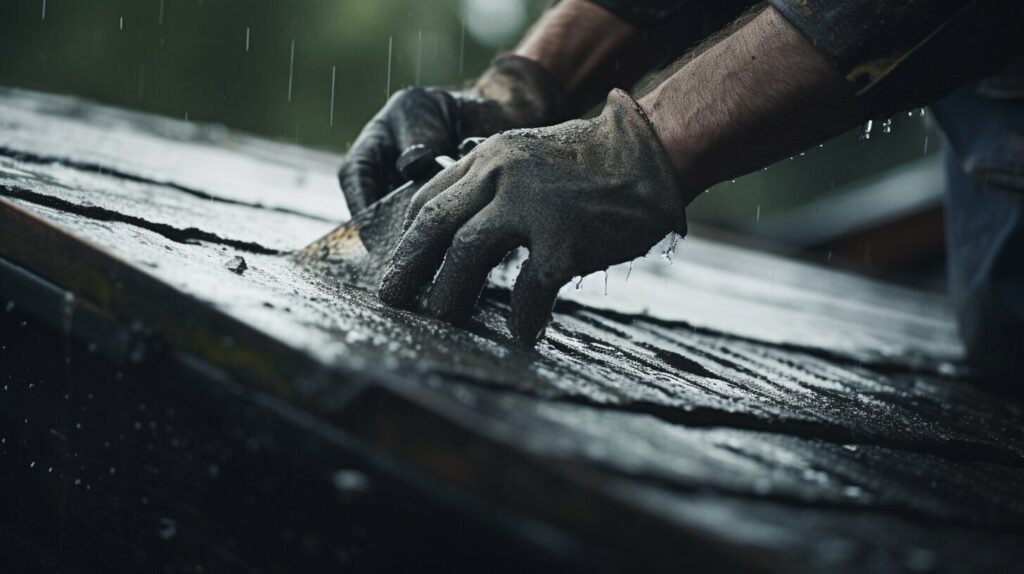
Preventing Roof Leaks in Heavy Rain
One of the best ways to protect your home during heavy rain is to prevent roof leaks. By taking proactive measures, you can keep your roof watertight and avoid costly repairs. Here are some tips for preventing roof leaks in heavy rain:
- Regular maintenance: Schedule regular roof inspections and maintenance to identify and address any potential issues before they become major problems. Make sure to clean gutters and remove any debris that can clog them.
- Timely repairs: Address any roof damage or leaks as soon as possible to prevent water from entering your home. Don’t wait for the next storm to arrive before fixing the issue.
- Proper ventilation: Ensure that your roof has adequate ventilation to prevent moisture buildup, which can lead to leaks.
- Reinforce vulnerable areas: If you live in an area prone to heavy rain, reinforce vulnerable areas of your roof to protect against leaks. This can include using waterproof materials and proper underlayment.
By implementing these preventative measures, you can protect your home from roof leaks during heavy rain and avoid costly repairs. However, if you do experience a roof leak during a storm, it’s important to take immediate action to minimize damage.
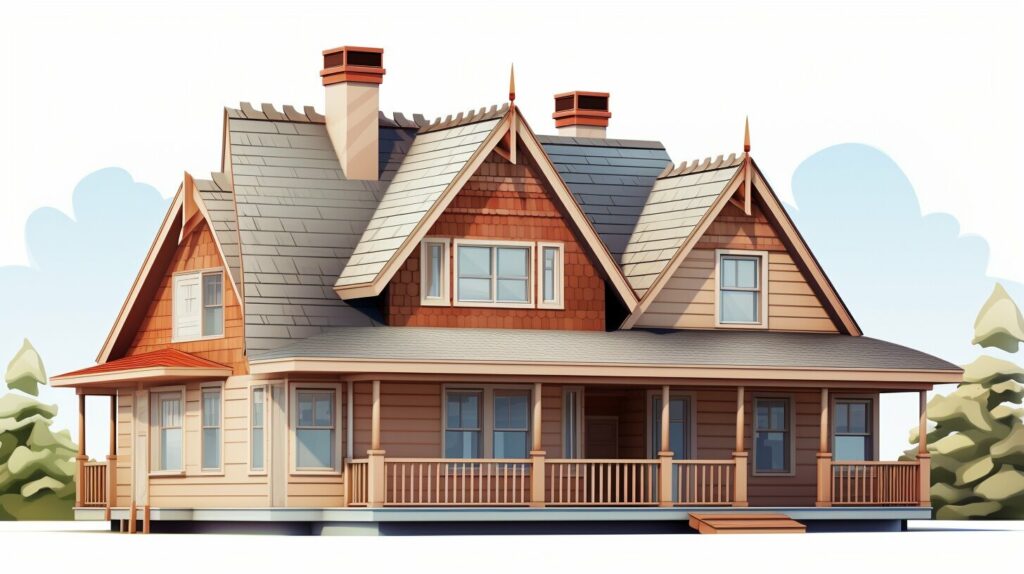
“Prevention is key when it comes to protecting your home from roof leaks during heavy rain. Regular maintenance, timely repairs, proper ventilation, and reinforcing vulnerable areas can help keep your roof watertight.”
Detecting Roof Leaks in Heavy Rain
If you suspect that your roof is leaking during heavy rain, it is important to detect the problem as soon as possible to prevent any further damage. Here are some common signs of roof leaks to look out for:
- Water stains on your ceiling or walls
- Dripping water or sounds of water dripping
- Musty or moldy smells in your home
- Visible damage to your roof such as missing or damaged shingles
If you notice any of these signs, it is important to take action quickly to identify the source of the leak. Common reasons for roof leaks in heavy rain include damaged shingles, clogged gutters, and inadequate flashing. Check these areas carefully for any visible damage. If you are unable to identify the source of the leak, it may be necessary to call in a professional.
One effective way to detect roof leaks is to perform a water test during a heavy rain shower. This involves using a hose to simulate rain and carefully monitoring where the water flows. Start at the bottom of your roof and work your way up, checking each area carefully for signs of leakage.
In addition to regular inspections and maintenance, prompt leak detection is critical in preventing further water damage or costly repairs to your home.
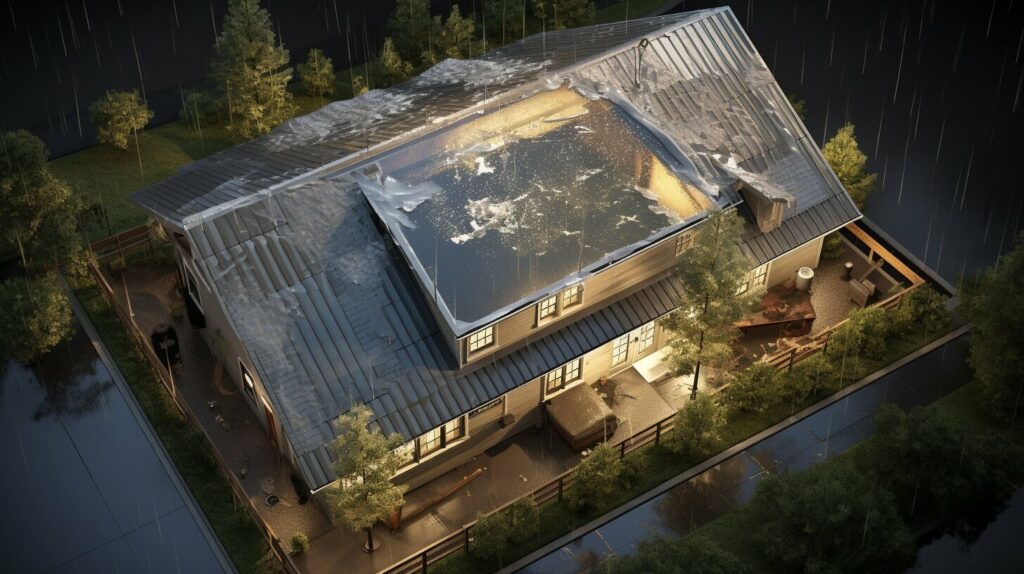
The Role of Proper Roof Drainage
Proper roof drainage plays a crucial role in preventing roof leaks during heavy rain. If water is not drained effectively, it can accumulate on your roof, increasing the likelihood of damage. To protect your roof from leaks in heavy rain, make sure your gutters and downspouts are clean and free of debris. Clogged gutters can cause water to overflow onto your roofing system, leading to water damage. You can use a small trowel or a garden hose to clean out your gutters regularly.
Moreover, your roof should have the proper slope to facilitate water runoff. If your roof is flat or has a low slope, water can accumulate and penetrate the roofing material, causing leaks. You can consult with a professional roofing contractor to ensure your roof has the correct slope. Additionally, you can install gutter guards to prevent debris from building up in your gutters.
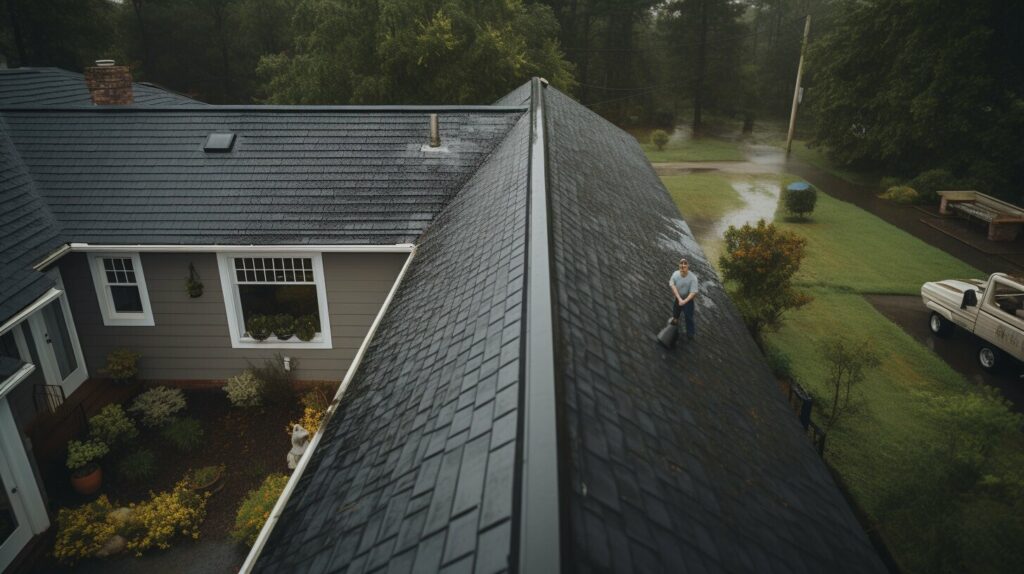
Finally, make sure your downspouts extend away from your home’s foundation. If water pools around your foundation, it can leak into your basement or crawl space, causing water damage and structural issues. You can use splash blocks or downspout extensions to direct water away from your home.
Addressing Roof Leaks with Professional Help
Despite your best efforts, there may come a time when you need to seek professional help to fix roof leaks during heavy rain. If you notice extensive damage or have tried temporary fixes that don’t work, it’s time to call a professional. Additionally, if you’re not comfortable working on the roof, it’s always better to leave it to the experts.
When looking for a roofing contractor, make sure to do your research and ask for referrals from friends and family. Look for licensed and insured professionals with experience in repairing roof leaks. Request a written estimate before any work is done and make sure to read the contract carefully.
Professional repair of roof leaks in heavy rain may involve replacing damaged shingles, repairing or replacing flashing, or even replacing the entire roof if the damage is extensive. A professional contractor will also have the necessary equipment and safety gear to perform the repairs safely and efficiently.
Remember, addressing roof leaks with professional help may seem like a significant expense, but it’s worth it. Delaying repairs can lead to more extensive damage and costly repairs down the line. So, when in doubt, always seek the help of a professional in fixing roof leaks during heavy rain.
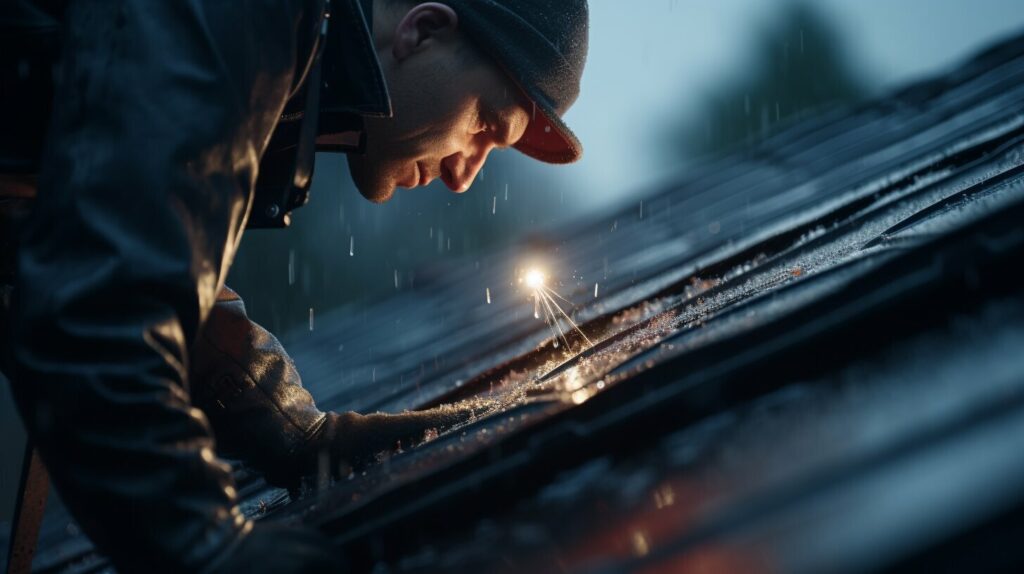
Protecting Your Roof During Extreme Weather Events
Heavy rain can be one of the most taxing conditions for your roof. To protect your roof from leaks during heavy rain, proactive measures are key. Maintaining a solid roof structure and efficient drainage system is essential for keeping your home dry.
One of the most effective ways of preventing roof leaks during heavy rain is to secure loose objects. Before the storm hits, remove any debris that could potentially fly off and damage your roof. It’s also important to reinforce any vulnerable areas in your roof, such as loose shingles or weak spots around chimneys or vents.
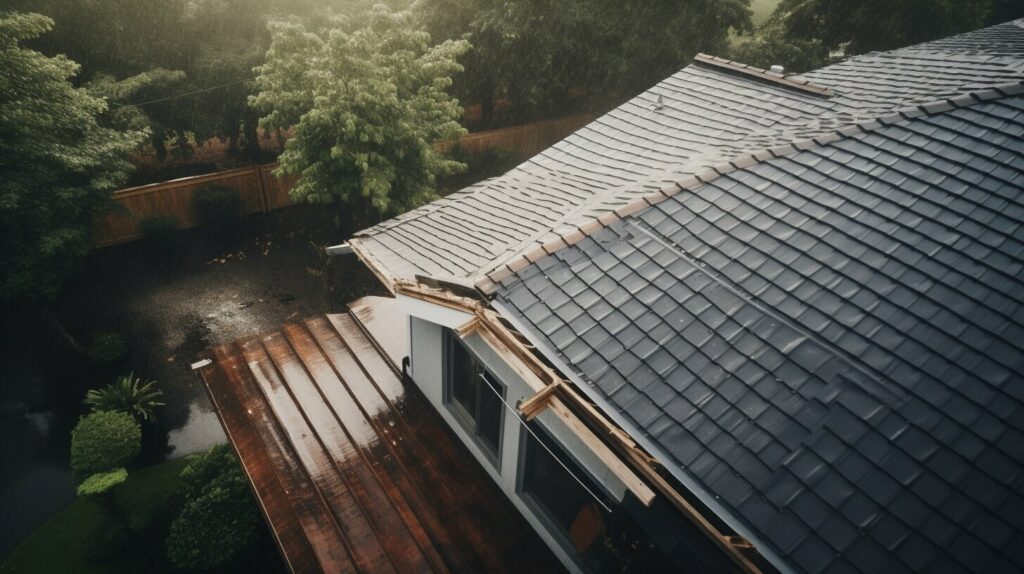
Regular maintenance of your roof and gutter system can go a long way in preventing leaks during heavy rain. Cleaning out your gutters and downspouts and removing any blockages will ensure proper drainage of water, reducing the likelihood of leaks. It’s also crucial to check for damaged shingles or flashing and repair or replace them as needed.
If you live in an area that frequently experiences extreme weather events, such as heavy rain or windstorms, consider upgrading your roof to withstand these conditions. A professional roofing contractor can help you select the best materials for your home and provide installation services.
By taking these steps to protect your roof from leaks during heavy rain, you can ensure that your home remains a safe and dry haven during even the most severe weather events.
Conclusion
Congratulations! You now have a better understanding of why your roof may be leaking during heavy rain and what you can do to prevent it. Remember to regularly inspect and maintain your roof, including gutters and flashing, to ensure it stays watertight. If you do detect a leak, act quickly to address it before it becomes a more serious problem.
By following the tips and advice provided in this article, you can protect your roof from leaks during heavy rain and keep your home and family safe and dry. Always remember: prevention is key!
So the next time you find yourself asking, “why does my roof leak in heavy rain?”, you’ll know exactly what to do. Take care of your roof, and it will take care of you.
FAQ
Q: Why does my roof leak in heavy rain?
A: Roof leaks during heavy rain can be caused by various factors, such as damaged shingles, clogged gutters, inadequate flashing, or improperly installed roofing materials.
Q: What are the signs of a roof leak in heavy rain?
A: Common signs of a roof leak in heavy rain include water stains or discoloration on ceilings or walls, dripping water, musty odors, or visible water damage in the attic.
Q: How can I fix roof leaks in heavy rain?
A: Temporary solutions for fixing roof leaks in heavy rain include using tarps or buckets to catch water, sealing small cracks with roof sealant, and clearing debris from gutters. For permanent repairs, it is best to seek professional help.
Q: What can I do to prevent roof leaks in heavy rain?
A: To prevent roof leaks in heavy rain, maintain regular roof inspections, clean gutters regularly, repair damaged shingles or flashing promptly, and ensure proper roof drainage. Additionally, regular maintenance and timely repairs can help prevent leaks.
Q: How can I detect roof leaks during heavy rain?
A: Look out for signs of water stains, drips, or musty odors in your home during heavy rain. Carefully inspect your attic and ceilings for any visible signs of water intrusion.
Q: What is the role of proper roof drainage in preventing leaks?
A: Proper roof drainage, including well-functioning gutters and downspouts, as well as a proper slope, plays a crucial role in preventing roof leaks during heavy rain. Efficient drainage helps redirect water away from the roof, reducing the risk of leaks.
Q: When should I seek professional help to address roof leaks in heavy rain?
A: You should consider seeking professional help for roof leaks in heavy rain if the damage is extensive, the leaks cannot be temporarily fixed, or if you are unsure about the cause of the leak. Professional roofers have the expertise to diagnose and repair roof leaks effectively.
Q: How can I protect my roof during extreme weather events?
A: To protect your roof during extreme weather events, ensure loose objects are secured, reinforce vulnerable areas, and conduct regular inspections and maintenance. Taking proactive measures can help minimize the risk of roof leaks during heavy rain.